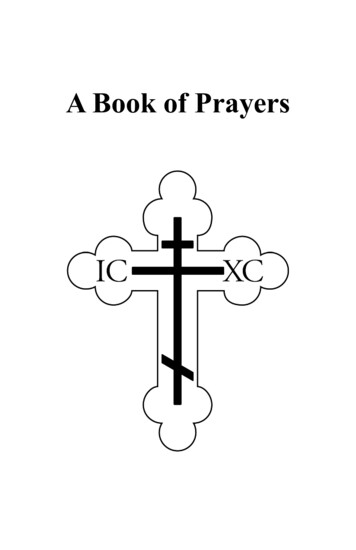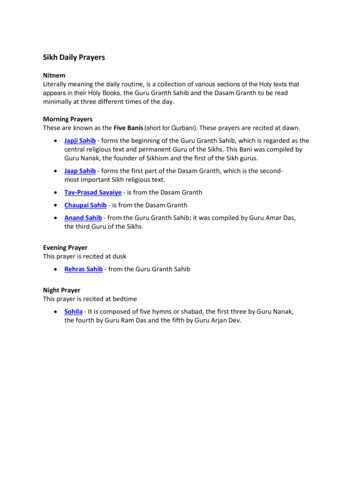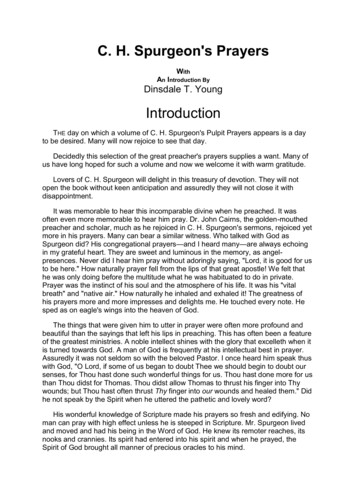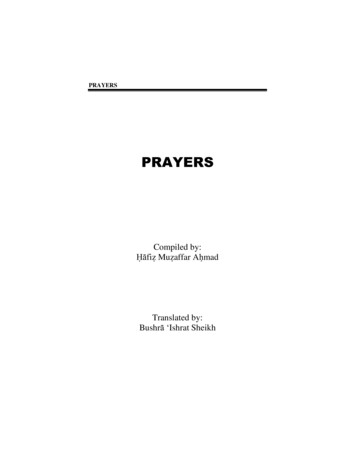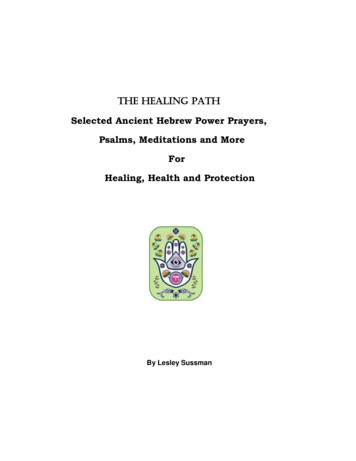
Transcription
Why Aren’tYour PrayersAnsweredToday?Books of The Holy ScripturesAs Written in The Book of YahwehThe following information is given to assist you with the true namesof the Apostles and Prophets within The Holy Scriptures.Book One (Old YahshuaJudgesRiyyahI SamuylII SamuylI KingsII KingsI JoshuaJudgesRuthI SamuelII SamuelI KingsII KingsI ChroniclesMattithyahYahchanan MarkLukeYahchananActsRomansI CorinthiansII CorinthiansGalatiansMatthewMarkLukeJohnActsRomansI CorinthiansII CorinthiansGalatiansII msProverbsEcclesiastesSong of SongsIsayahYeremyahLamentationsYechetzqyahII ChroniclesEzraNehemiahMegilla EstherJobPsalmsProverbsEcclesiastesSong of kkukZephanyahChagyahZecharyahMalakyahBook Two (New Testament)EphesiansPhilippiansColossiansI ThessaloniansII ThessaloniansI TimayahII I ThessaloniansII ThessaloniansI TimothyII TimothyTitusPhilemonHebrewsYaaqobI KephaII KephaI YahchananII YahchananIII YahchananYahdahRevelation—A House of Yahweh sJamesI PeterII PeterI JohnII JohnIII JohnJudeRevelation
Why Aren’tYour PrayersAnswered Today?In our world today, with thousands of churches and assembliesin the United States alone, millions of prayers are said daily thatare never heard by the Heavenly Father.There is a simple reason why these prayers are not answered.The reason is revealed in the Holy Scriptures. However, Satanhas effectively deceived this whole world, just as Revelation 12:9says, so the answer in the scriptures is overlooked.Our Creator does not hide the reason for unanswered prayer.In fact, He fully expounds the reason why He does not hear.But, because Satan’s preachers keep proclaiming the lie that‘‘all is well,’’ the deceived people in this world simply do notfeel the need to search the scriptures for this reason. Yes, thesedeceived preachers are continuously leading this deceived worldinto needless suffering, and they will finally lead this deceivedworld into destruction.Hundreds of letters are written to The House of Yahwehthanking us for the information contained in this booklet; forour free monthly magazine, The Prophetic Word, which is sent toall who are on our mailing list; and for the messages proclaimedon cassette tapes.These same people who Yahweh is calling out, after turningto Yahweh our Creator and calling with His holy Name, just asthe prophets of old, our Messiah, and His disciples did, startreceiving the blessings of answered prayers.Life then becomes meaningful; a life of purpose which isjoyously lived. Blessings, never before dreamed of, are givenby Yahweh our Father to those who love Him.As you read this booklet, keep the following scripture firmlyin mind. Revelation 12:9—And the great dragon was cast out, that old serpent, called theDevil, and Satan, who deceives the whole world. She was cast outinto the earth, and her angels were cast out with her.1
Satan, just as this scripture inspired to be written by Yahwehsays, has the whole world deceived. Isayah 59:1-2—1 Behold, Yahweh’s hand is not shortened, that it cannot save;nor His ear heavy, that it cannot hear.2 But your own iniquities have separated you from your Father;and your own sins have caused Him to hide His face from you, soHe will not listen.Yahweh will not hear us, He will not listen to us, becauseof our sins. Yaaqob 2:10—For whoever keeps the whole Law, and yet offends in one point,he is guilty of all. I Yahchanan 3:4—Whoever commits sin, transgresses also the Law; for sin is thetransgression of the Law.The scriptural definition of sin is simply the breaking ofYahweh’s Law.Sin, the breaking of Yahweh’s Law, is exactly what Isayah59:1-2 says cuts us off from Yahweh and causes Yahweh not tohear our prayers.Do you think asking, ‘‘Why aren’t your prayers answered’’ is astrange question? If so, look around at the suffering taking place inyour own neighborhood. If your city is like every other city in theworld, it is filled with churches, which are filled with people everySunday morning. Usually, you only have to drive a few blocks tosee another church. Each of these churches contain more wealththan almost any business or organization in the community.Not only do we see all these churches, we also see peoplesuffering from every kind of mental and physical sickness anddisease. Hospitals cannot be built fast enough to care for thesick and those injured by accidents which kill and cripple.Are these things not a witness that something is drasticallywrong in today’s world? Acts 10:34-35—34 Then Kepha opened his mouth, and said; Of a truth I perceivethat Yahweh is no respecter of persons;35 But in every nation he who reverences Him, and works righteousness, is accepted by Him.Yahweh is no respecter of persons. If we are not receiving2
answers to our prayers, it is because there is something weare lacking. We just read in Acts 10:34-35 how we may beaccepted by Yahweh. First, we must reverence Yahweh, andthen we must work righteousness.Since Yahweh is no respecter of persons, and we have thesame promises that the early believers had, then we can haveour prayers answered just as the early believers did, if andonly if, we will heed all the inspired Holy Scriptures.Most people claim to follow the Bible. However, the sameBible they claim to follow gives certain facts that the majorityof this world knows nothing about. John 14:13-14, KJV—13 And whatsoever ye shall ask in My Name, that will I do, thatthe Father may be glorified in the Son.14 If ye shall ask any thing In My Name, I will do it. John 15:16, KJV—Ye have not chosen Me, but I have chosen you, and ordained you,that ye should go and bring forth fruit, and that your fruit shouldremain: that whatsoever ye shall ask of the Father In My Name,He may give it you. John 16:24, KJV—Hitherto have ye asked nothing In My Name: ask, and ye shallreceive, that your joy may be full. Mark 16:17-18, KJV—17 And these signs shall follow them that believe; In My Nameshall they cast out devils; they shall speak with new tongues;18 They shall take up serpents; and if they drink any deadlything, it shall not hurt them; they shall lay hands on the sick, andthey shall recover. John 14:12, KJV—Verily, verily, I say unto you, he that believeth on Me, the worksthat I do shall he do also; and greater works than these shall he do;because I go unto My Father.Why aren’t these works being done? There is a very simpleanswer to this question, which is found in the previous scriptures we have just read—‘‘Ask in My Name.’’When people pray today, do they use the Name of our theName of His Son when they ask through His authority? Theanswer is, NO! Most people do not even know their Names.Do you?Scriptural AuthoritiesThe Holy Scriptures were not originally written in the En3
glish language. The inspired scriptures were first written inHebrew, and the holy Name was written and spoken aloudat the time these original scriptures were written.However, in time, the scribes, sages, and copyists who were incharge of the Law of Yahweh began to think that the Name wastoo holy to use in everyday speech and writing. Because of thiserroneous thinking, these authorities began to teach the peoplethat one had to substitute titles in each place where Yahweh’sName was written; titles such as Lord (Adonai) and God (El).Throughout this article, authoritative references, Bibledictionaries, encyclopedias, commentaries, and interlinears,will be used to substantiate the importance of Yahweh’s Nameand the importance of using it.The first translation of the Hebrew scriptures was writtenin Greek: The Septuagint Version. The men who translatedthis version knew the Name of Yahweh, but they chose to usethe title Kurios-Lord.The Greek version was subsequently translated into Latin. The men who translated this version knew the Name ofYahweh, but they chose to use the title Dominus- (Kurios)-Lord in the Latin Vulgate.The English versions were then translated from the Latin. Themen who translated these versions knew the Name of Yahweh,but they chose to use the title Lord in the King James Version.Yes, the people who translated the Bible knew theNames of our Heavenly Father and His Son. Most Biblescholars know their Names, but deny them when prayingor teaching. Instead they use the titles Lord or God. Thesetitles are not the Names of our Creator and His only begotten Son. As a result, they have lost the keys to answeredprayers; keys which unlock the door to the very throne ofour Creator.What Does Lord God Mean? Webster’s New World Dictionary, Second College Edition1986, pages 835-836, defines the words lord-Lord-Lords.lord (lôrd) n. [ME. OE. hlaford earlier hlafweard hlaf (cf. LOAF 1 ) weard (cf. WARD , WARDEN ) : basic sense—‘‘loaf keeper’’ (i.e., one who feeds dependents): some senses infl. by use as transl. of L. dominus] 1. a4
person having great power and authority: ruler; master2. the owner and head of a feudal estate 3. one's husband: now humorous 4. [L-] (a) God (with the except indirect address) (b) Jesus Christ (often with Our) 5. inGreat Britain (a) a nobleman holding the rank of baron, viscount, earl, or marquess; member of the Houseof Lords (b) a man who by courtesy or because of hisoffice is given the title of Lord, as a bishop, the son ofa duke, or a Lord Mayor 6. [L-] [pl.] the House of Lordsin the British Parliament (usually with the) 7. [L-] inGreat Britain, the title of a lord, variously used: as Earlof Leicester, John Doe would be called Lord Leicester;as a baron, John, Lord Doe; as the son of a marquess orduke, Lord John Doe—interj. [often L-] an exclamationof surprise or irritation—vi. to act like a lord; rule: chiefly in the phrase lord it (over), to act in an overbearing,dictatorial manner (toward) lord of. vt. [Now Rare] tomake a lord ofFrom this same dictionary on page 559, we find the meaningsof the words god-God.god (gäd, gôd) n. [ME. OE., akin to G. gott, Goth. guth,prob. IE. base *ghau-, to call out to, invoke, whenceSans. havate, (he) calls upon] 1. any of various beingsconceived of as supernatural, immortal, and having special powers over the lives and affairs of people and thecourse of nature; deity, esp. a male deity 2. an imagethat is worshiped: idol 3. a person or thing deified orexcessively honored and admired—[G-] in monotheisticreligions, the creator and ruler of the universe, regarded as eternal, infinite, all-powerful, and all-knowing;Supreme Being; Almighty. Often used in exclamations[good God! God almighty! my God!]As you have read from these definitions, a Lord can be a man,and a God can be an image or an idol. Yes, the definitionsof the words Lord and God are titles that can be applied toman, Satan, beasts, or things. Could this be the reason ourCreator inspired the Apostle Shaul to write the following? Romans 1:23—And exchanged the glory of the uncorruptible Father for images,made to resemble corruptible man, and birds, four-footed beasts,and creeping things.Yahweh’s glory is His Name. Shaul said that Yahweh’s glory,Yahweh’s Name, was exchanged for images—Lords and Gods.In Exodus 33:18, the Prophet Mosheh asked Yahweh to5
show him His glory. Exodus 33:19—And Yahweh said: I will make all My righteousness pass in front ofyou; and I will proclaim My Name, Yahweh, in your presence. I willhave mercy on whom I will have mercy, and I will have compassionon whom I will have compassion.What Is His Name?Do the Bible translators and scholars know the Creator’sName? All you have to do is read their works, and you willfind that they do.Joseph Bryant Rotherham, in The Emphasized Bible; ANew Translation, 1902, in the Introduction, the Incommunicable Name, says Yahweh’s Name was suppressed.The Name Suppressed: THE FACTIt is willingly admitted that the suppression has not beenabsolute; at least so far as Hebrew and English are concerned. The Name, in its four essential letters (YHWH),was reverently transcribed by the Hebrew copyist, andtherefore was necessarily placed before the eye of the Hebrew reader. The latter, however, was instructed not topronounce it, but to utter instead a less sacred name—ADONAY or ELOHIM. In this way The Name was notsuffered to reach the ear of the listener. To that degreeit was suppressed. The Septuagint, or ancient Greek version (LXX), made the concealment complete by regularlysubstituting Kurios; as the Vulgate, in like manner, employed Dominius; both Kurios and Dominus having at thesame time their own proper service to render as correctlyanswering to the Hebrew ADONAY, confessedly meaningLord. The English versions do nearly the same things, inrendering The Name as LORD, and occasionally GOD;these terms also having their own rightful office to fill asfitly representing the Hebrew titles Adonay and Elohimand El, so that the Tetragrammaton is nearly hidden inour public English versions.The Immediate Consequences of the Suppression:(i.)Partly literary, though more than that. Reference ishere made to the confusion into which many things arethrown through this abnormal state of things. ‘Baal’ is‘lord’, and so is ‘Adon’ (Adonay) that is distressing; butwhy add to the embarrassment by rendering YHWHalso as ‘Lord’? Worst of all is the confusion when ‘Y’and Adonay occur together, as they do many times inthe Book of Ezekiel (Yechetzqyah). Inasmuch as to say,‘Lord LORD’ for ‘Adonay Y’, was too grotesque and mis-6
leading (positively false to the ear), the new device hadto be resorted to of rendering this combination by ‘LordGOD’—‘GOD’ in this case, and not ‘Lord’ at all, standingfor The Name. Even YH (the shorter form) and YHWH(the full form) of the tetragrammaton, coming together,caused a dilemma; though in these instances, the acuteness of the trouble compelled the adoption of a partialremedy, and ‘the LORD JEHOVAH; is the result. ‘Confusion’, then, is a term not a whit too strong to apply tothese varying devices. No wonder that even intelligentand educated people are continually forgetting whatthey have heard or read concerning so involved a matter.Rotherham then gives reasons why the Name Yahweh mustbe restored, and from now on retained in the scriptures.1. Because its suppression was a mistake. So grave amistake cannot be corrected too soon. An unwarrantable liberty has been taken; the path of humility is toretrace our steps.it is too heavily burdened with merited critical condemnation as modern, as a compromise,as a ‘mongrel’ word, ‘hybrid’, ‘fantastic’, ‘monstrous’. Thefacts have only to be known to justify this verdict, and tovindicate the propriety of not em- ploying it in a new andindependent translation. What are the facts? And firstas to age. ‘The pronunciation Jehovah was unknown until 1520, when it was introduced by Galatinus; but wascontested by Le Mercier, J. Drusius, and L. Capellus, asagainst grammatical and historical propriety.’ (OxfordGesenius, P. 218.) Next, as to formation. ‘Erroneouslywritten and pronounced Jehovah, which is merely a combination of the sacred Tetragrammaton and the vowelsin the Hebrew for Lord, substituted by the Jews (Yahdaim) for JHVH (YHWH), because they shrank frompronouncing The Name, owing to an old misconceptionof the two passages (Exodus xx. 7 and Leviticus xxiv.16).To give the name JHVH the vowels of the word forLord (Heb. Adonai) and pronounce it Jehovah, is aboutas hybrid a combination as it would be to spell the nameGermany with the vowels in the name Portugal—viz.,Gormuna.Jehovah is not older than about 1520 c.e.The very oldest Scriptural text ever found, dating back almost 2,600 years, was in a tiny silver amulet which containsa Seventh Century b.c.e. extract from the Book of Numbers(6:24-26), the Priestly Blessing. The amulet was part of atreasure hoard found by a Tel Aviv University archaeologistin a First Temple Period family tomb in Yerusalem, Israyl.7
When this text was written, the Temple of Solomon stillstood, the heirs of King David still ruled on the throne,and the Dead Sea Scrolls would not be written for another400 years.It was three years after its discovery before this fragilescroll of text could be unrolled by technical experts at theIsrayli Museum. On this scroll the Name of Yahweh could beclearly read. Complete details of this magnificent find can beread in the 6-28-86 and 8-9-86 issues of The Jerusalem Post,and the 6-87 issue of The Readers Digest.There is no doubt that the true Name of our Creator isYahweh. In fact, the evidence is overwhelming.Unger’s Bible Dictionary, by Merrill F. Unger, 1957, page1177, says:Yahweh. The Hebrew tetragrammaton (YHWH) traditionally pronounced Jehovah (q.v.) is now known to becorrectly vocalized yahwê. New inscriptional evidencefrom the second and first millennia b.c. point towardthis fact. The old view of Le Clerc, modernly propounded by Paul Haupt and developed by W.F. Albright, hascommended itself in the light of the phonetic development and grammatical evidence of increased knowledgeof Northwest Semitic and kindred tongues. This thesisholds Yahwe to be originally a finite causative verb fromthe Northwest Semitic root hwy ‘‘to be, to come into being,’’ so that the divine name would mean ‘‘he causes tobe, or exist,’’ i.e., ‘‘he creates.’’ Amorite personal namesafter 2,000 B.C. lend support to the Haupt-Albright view,demonstrating that the employment of the causativestem yahwe ‘‘he creates’’ was in vogue in the linguisticbackground of early Hebrew. Another recent etymologyis that of Sigmund Mowinckel and James Montgomery.This suggests that Yahu (an abbreviated form of Yahwecurrent in personal names) is a compound formation ya(O!) and hu or huwa (he), ‘‘O He!’’ The name Yahwe hasbeen found to be unique to Israel and has not been verified as the name of any deity outside Israel. Wycliffe Bible Encyclopedia, 1975, Volume 2, page 690,tells us:‘The Name par excellence for the Creator of Israel isYahweh, found 6,823 times in the OT. Through Israel'sdeliverance from bondage in Egypt, adoption as a nation, and guidance to the Promised Land, the Redeemer-Creator is especially known by this name.’8
The Interpreter’s Dictionary, 1962, Volume 4, page 923, says:‘YAHWEH—The vocalization of the four consonants ofthe Israelite name for the Creator, which scholars believe to approximate the original pronunciation.’James Moffatt in his translation, The Bible: A New Translation,1935, Harper and Brothers, informs us in his introduction:‘Strictly speaking this ought to be rendered ‘Yahweh’which is familiar to modern readers in the erroneousform of ‘Jehovah’. Were this version intended for students of the original, there would be no hesitation whatever in printing ‘Yahweh’.Although Moffatt substitutes the title “the Eternal” in theplace of the Name of Yahweh, he fully admits a distinct lossof meaning in this.The Encyclopedia Judaica, 1972, Volume 7, page 680, statesemphatically:‘The true pronunciation of the Name YHWH was neverlost. Several early Greek writers of the Christian Churchtestify that the Name was pronounced ‘‘Yahweh’’.The personal Name of the Father of Israyl is written in theHebrew scriptures with the four consonants YHWH and isreferred to as the Tetragrammaton. At least until the destruction of the First Temple in 586 b.c.e., Yahweh’s Name waspronounced regularly with its proper vowels, as is clear fromthe Lachish Letters, written shortly before that day. However,at least by the third century before Yahshua our Messiah wasborn, the pronunciation of the Name Yahweh was avoidedand Adonai—Lord—was substituted for it.The Century Bible, Volume 1, pages 90-91, by Adeney andBennett, tells us:Some time after the return from the Captivity, and before the beginning of the Christian era, the Yahdaim(Jews) came to believe that the Holy Name Yahweh wastoo sacred to be uttered on ordinary occasions. It wassaid to be pronounced by the High Priest on the Day ofAtonement. At other times, when any one read or quotedaloud from what is called the Old Testament, the word‘Adonay’, ‘Lord,’ was usually substituted for Yahweh, andsimilarly the LXX (Septuagint Version) has Kurios, the9
Vulgate dominus, and the E.V. LORD, where the Hebrewhas Yahweh. Hebrew was originally written without vowels, but when the ‘vowel points’ were added, the vowelsof ‘Adonay’ or ‘Elohim’ were written with Yahweh, as adirection that these words were to be read instead of theword whose consonants were Yahweh; thus we find thecombinations YeHoWaH and YeHoWiH. At the Reformation, the former being the more usual, was sometimesused as the Name of the (Mighty One) of Israyl, and owing to ignorance of its history was misread as ‘Jehovah,’ aform which has established itself in English, but does notgive the pronunciation of the Holy Name it represents.In the Middle Ages, when the consonantal text was suppliedwith vowel points by the Masorites, the Tetragrammaton wassubstituted in over 130 places in the Hebrew Text with theCanaanite god, Adonay, and in some places Elohim (God,Gods) wherever anthropomorphism (ascribing the physicalattributes of man to Yahweh) was applied. Wherever theyleft the Tetragrammaton intact, they placed diacritical marksbeneath it to indicate pronunciation of the word to be spoken—Adonay, not the word written—Yahweh, which theHebrews considered too sacred to be spoken aloud.For Yahweh they have substituted Baal, the Babyloniangod, and Adonay, the Canaanite god of the Phoenicians, bothcorresponding to the English word Lord.Likewise, the Name of Yahweh’s Son, Yahshua (Yahwehis Salvation), has been substituted by Yeshua, Iesous, Iesus,Jesus, and Ea-Zeus (healing Zeus). Webster’s Dictionary saysthat Zeus is the sky God, and is also known as Deus (Latin),Dio (Italian), Dios (Spanish), Dayus (Sanscript), and ZeusSoter, meaning Zeus the Savior.The substitution of the Names of Yahweh and Yahshua,with the names of pagan gods, has brought immeasurableharm. Such names as Lord, God, Jesus and Christ in no wayrepresent the meaning of the Name revealed by Yahweh ourHeavenly Father to Mosheh, and to the ancient Hebrews. Byemploying these names, the people unknowingly turn theworship of Yahweh into that of Gods, and actually ascribethe loving and merciful characteristics of the Father of Israylto the pagan Gods (Hosheyah 2:8).The Jehovah’s Witnesses in their interlinear, The KingdomInterlinear Translation of the Greek Scriptures, The Watchtower10
Bible and Tract Society of New York, Inc., page 23, admit intheir Foreword that:‘While inclining to view the pronunciation ‘Yahweh’ asthe more correct way, we have retained the form ‘Jehovah’ because of people's familiarity with it since the 14thCentury.’As an opposing example, The New International VersionInterlinear Hebrew-English Old Testament, by John R. Kohlenberger III, Volume 1, page 26, elects to use Yahweh's Namewherever it is written in the Hebrew Text. In the Introductionwe find this statement:Yahweh, the personal Name of (the Creator), is alwaystranslated ‘Yahweh’, against the practice in the NIV inrendering it as ‘Lord’. On the one hand, this preventsconfusion of this Name with the title (Adonai) ‘my Lord’,for the idea of lordship is not an integral element of theName. On the other hand, it may be the use of Yahwehin this work will encourage the reader to use the personal Name of (Yahweh) in prayer and praise, as is intended by the most common imperative in the Scriptures:(HalleluYahweh!) Psalm 104:35: Praise Yahweh!Baal Is The Lord!The word Baal simply means Lord as shown in any BibleDictionary. Unger’s Bible Dictionary, for instance, under thesubject Lord on page 665 says:Lord, the rendering of several Hebrew and Greek words,which have a very different meaning from each other:1. Jehovah (yahweh) (Heb. YHWH, self-existent), Jehovah. This is used as a proper name of god only, andshould have been retained in that form by the translators. See Jehovah.2. Lord (Heb. ‘Adōn), an early word denoting ownership; hence, absolute control. It is not properly a divinetitle, being used of the owner of slaves (Gen. 24:14, 27;39:2, 7; A. V. “master”); of kings as the lords of their subjects (isa. 26:13); of a husband as lord of the wife (Gen.18:12). It is applied to God as the owner and governor ofthe whole earth (Exod. 23:13; Psa. 114:7). it is sometimesused as a term of respect, like our sir; but with a pronounattached (“my lord”), and often occurs in the plural.3. Adonai (Heb. ‘ădōnai), emphatic, the Lord; and bymany regarded as the plural of No. 2. it is used chieflyin the Pentateuch; always where God is submissively11
and reverently addressed (Exod. 4:10,13; Josh. 7:8); also when god is spokenof (I Kings 13:9; 22:6, etc.). The Jews,out of a superstitious reverence for thename Jehovah, always, in reading,pronounce Adonai where Jehovah iswritten. The similar form, with thesuffix, is also used of men, as of Potiphar (Gen. 39:2, sq.; A. V. “master”),and of Joseph (42:30, 33).4. Lord, Master (Gr. kupios, supreme), he to whom a person or thingbelongs, the master, the one havingdisposition of men or property,5. Baal (Heb. ba’al, master), applied only to heathen deities, or to man as husband, etc., orto one specially skilled in a trade or profession. See Baal.Continuing in Unger’s Bible Dictionary on page 413, we find thedefinition of Baal.Baal (baal), common Canaanite wordfor “master, lord,” was one of the chiefmale deities of the Canaanite pantheon, now well-known from the religious epic literature discovered at RasShamra (ancient Ugarit of the Amarna Letters) from 1921-1937. Baal wasthe son of El, the father of the gods andthe head of the Canaanite pantheon,according to the tablets from Ugarit.He is also designated as “the son of Dagon” (Heb. dagan,“grain”), an ancient Canaanite and Mesopotamian deityassociated with agriculture. Baal was thus the farm godwho gave increase to family and field, flocks and herds.He was likewise identified with the storm-god Hadadwhose voice could be heard in the reverberating thunderthat accompanied rain, which was so necessary for thesuccess of the crops. Smith’s Bible Dictionary, 1872, states:The substitution of the word Lord is most unfortunate;for, while it in no way represents the meaning of theSacred Name, the mind has constantly to guard againsta confusion with its lower uses, and, above all, the direct personal hearing of the Name on the revelation ofYahweh.is injuriously out of sight.Lord is a title for Baal, not a title for Yahweh our Creator.12
When one prays to Lord one is praying to Baal, not to Yahweh!What About The Word God?We have already shown from Webster’s Dictionary that theword God can be applied to anything: man, Satan, beast orthing. Unger’s Bible Dictionary, page 412, shows that the titleof God was also a title for Baal.In like fashion the Canaanite plural Elohim (‘‘gods’’) wasadopted by the Hebrews to express all the excellenciesand attributes of the one true God. M.F.U.As we have already read on page 413 of this source reference:Baal was the son of El, the father of the gods and thehead of the Canaanite pantheon. Unger’s Bible Dictionary, shows on page 112, this information concerning Baal:Ba al (bā al; Heb. bă ăl, lord, possessor).1. A very common name for god among the Phoenicians. The word is also used of the master and owner ofa house (Exod. 22:7; Judg. 19:22); of a landowner (Job.31:39); of an owner of cattle (Exod. 21:28; Isa. 1:3), etc.The word is often used as a prefix to names of towns andmen, e. g., Baal-gad, Baal-hanan, etc.2. The name of the chief male god of the Phoenicians.From this alone we see that the word God was never a namefor the Creator, it was a title for pagan Gods! For facts aboutwho you are actually worshiping when you call upon Lord andGod, write for our Free Booklet: Who Is Lord God, Who Is Baal?Yahweh Is His Name The New International Version Interlinear Hebrew-English Old Testament, John R. Kohlenberger III, 1979,Volume 1, page 9, is displayed, which shows the Creator’sName written in these scriptures; the Holy Name whichthe misinformed scribes, sages, and copyists hid fromthe people; the Creator’s Holy Name which man choseto replace with the titles of pagan Gods and Lords—Genesis 4:6-16:13
14
There are many authoritative references that substantiatethe fact that the true Name of our Creator is Yahweh, andthat His Name was replaced by titles that could be appliedto man, Satan, beasts, or things.This fact also remains, in doing this dishonor to Yahweh,these translators, scholars and those who have followed themin their error, have forfeited the power that was given to theprophets of old, to Yahshua Messiah, to His apostles, and tothe early believers.We simply cannot deny Yahweh’s Name, and then expectHim to hear us when we pray. This is the very reason thatprayer is not being answered in the churches and assembliesof this world today.Some intellectuals have made excuses for not using theNames of Yahweh and Yahshua, making this statement: ‘‘Tocome to the Creator in the Name of the Son is to come inthe authority of the Son.’’Think about this for a moment: How much sense wouldit make for you to go to the bank in the name of or by theauthority of John Jones and when you get there use the nameof Pete Lowe? It doesn’t make any sense at all, does it? Romans 9:17—.that My Name might be declared in all the earth.You simply cannot declare something if you keep it hidden!Our Creator Yahweh, blessed be His Name, even asked thisquestion: Yeremyah 23:25-27—25 I have heard what the prophets say, who prophesy lies in MyName, saying; I have dreamed! I have dreamed!26 How long will this be in the heart of the prophets who prophesy lies? Yes, they are prophets of the deceit of their own min
in the United States alone, millions of prayers are said daily that are never heard by the Heavenly Father. There is a simple reason why these prayers are not answered. The reason is revealed in the Holy Scriptures. However, Satan has effectively deceived this whole world, just as Revelation 12:9 says, so the
